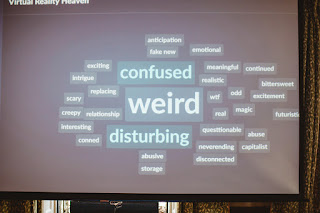Step 4: Ask 'Is it going to be OK?'
Is it going to be OK?
This whole shebang of Kilter working with Public Engagement in cutting-edge science is pretty funny. We’re actors, writers, designers, directors… We never tire of saying we 'flunked math'. We don’t do science.
What we do understand is people. We’ve spent our working lives observing people (literally sitting in cafes sometimes - not bad as jobs go.) We do it because we feel a responsibility to understand behaviour - to empathise with every delicate nuance & surprise. Why? Because we want to be able to recreate accurate believable depictions of people as characters onstage. If the people we make up & show off aren’t truthful, things fall apart & the audience leaves at the interval.
Anyway, that’s the Kilter Public Engagement brief for this particular gig: look at the science & then look at the people. Think about how what’s going on in the labs today is going to effect people in the future. How is society going to react? Is it going to be OK?
It’s a big question and we can’t take the responsibility of answering it all by ourselves. We spend hours & hours asking anyone & everyone we meet:
“Is it OK to carry on building something in a lab that could spell d.i.s.a.s.t.e.r for your descendants down the line?”
“Of course not.”
“What about if It could spell s.a.v.e.t.h.e.p.l.a.n.e.t too?”
“.....Well, which is it?”
“Not sure. It isn’t built yet. What do you reckon, carry on or drop it?”
Guess what - there isn’t a single simple answer, there’s just a great big swampy conversation. The people who you think would be up for it find great big glaring reasons to abandon ship & the people you had down as hard-line cave-dwellers can only see blue skies. It’s glorious technicolour.
We try to give as many people as possible the opportunity to weigh in. Even if none of us are going to be around to witness Flying Cars or Life on Mars, most of us feel like we have a stake in the future. We rake in every wonderer, philosopher & clairvoyant we can find.
Researchers at Universities across the country are actually obliged to engage with this kind of ethical tangle all the time. By & large it seems scientific research is pulled along by curiousity - a simple human desire to know more. But just because a mountain is there, it may not always be the right thing to climb it… at least not without thinking long & hard about what might be on the other side.
Which is where RRI comes in. Responsible Research & Innovation. It compels researchers across the country to ask themselves ‘is it going to be OK?’ ‘Am I sure that what I’m doing is for the right reasons; am I happy that as many people as conceivably possible are going to be OK with the possible outcomes?’
Darwin set sail on The Beagle to develop his Theory of Evolution. Little did he imagine what the consequences would be for the God-fearing majority who still set their stall with Adam & Eve. Would Darwin have done things differently if he had subjected his thinking to a bit of RRI & anticipated the crisis in human understanding & existentialism that he initiated? Perhaps not. But if he’d worked creatively with Kilter, perhaps we could have talked about it together & created a representative stake-holders group to ask ‘is it going to be OK’?!
Is it going to be OK developing Quantum Computers that could eat the internet for breakfast?
Is it going to be OK pushing Virtual Reality into every part of our lives?
Is it going to be OK?


Comments
Post a Comment